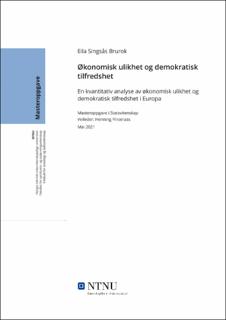| dc.contributor.advisor | Finseraas, Henning | |
| dc.contributor.author | Singsås Brurok, Eila | |
| dc.date.accessioned | 2021-09-28T17:34:03Z | |
| dc.date.available | 2021-09-28T17:34:03Z | |
| dc.date.issued | 2021 | |
| dc.identifier | no.ntnu:inspera:80180200:5251506 | |
| dc.identifier.uri | https://hdl.handle.net/11250/2784558 | |
| dc.description.abstract | Denne oppgaven undersøker forholdet mellom økonomisk ulikhet og demokratisk tilfredshet i Europa. Oppgaven tar utgangspunkt i to modeller for regimestøtte. Den ene vektlegger demokratisk representasjon, mens den andre vektlegger demokratisk prestasjon. Oppgaven anvender flernivåregresjonsanalyse. Det gjør det mulig å undersøke hvordan variabler på både individnivå og landnivå kan påvirke demokratisk tilfredshet. For å måle økonomisk ulikhet benyttes Gini-indeksen. Jeg benytter data fra European Social Survey for individnivåvariabler, og Eurostat og Verdensbanken for makroøkonomiske variabler. Resultatene indikerer at det ikke er en sammenheng mellom økonomisk ulikhet og demokratisk tilfredshet. Det som derimot virker å være sentralt, er nivå av korrupsjon og økonomisk utvikling. Funnene er i tråd med modellen for regimestøtte som vektlegger demokratisk prestasjon der kvaliteten på offentlige institusjoner og økonomisk prestasjon er sentralt. På individnivå er subjektiv oppfattelse av nasjonal økonomi og egen inntekt viktig for tilfredsheten. | |
| dc.description.abstract | This thesis investigates the relationship between economic inequality and democratic satisfaction in Europe. The thesis draws on two models for regime support. One emphasizes democratic representation, while the other emphasizes democratic performance. The thesis uses multilevel regression analysis. This makes it possible to investigate how variables at both the individual level and country level can affect democratic satisfaction. The Gini Index is used to measure economic inequality. I use data from European Social Survey for individual variables, and Eurostat and the World Bank for the macroeconomic variables. I do not find support for my research question, and the analysis shows no relationship between economic inequality and democratic satisfaction. What, on the other hand, seems to be important is the level of corruption and economic development. The findings are in line with the model for regime support that emphasizes democratic performance where quality of government and economic performance plays the pivotal role. At the individual level, results suggest that subjective perception of the national economy and own income is important for satisfaction. | |
| dc.language | nob | |
| dc.publisher | NTNU | |
| dc.title | Økonomisk ulikhet og demokratisk tilfredshet | |
| dc.type | Master thesis | |
